Oil producers fume at ‘third world’ profits grab
The US oil industry charged the government with behaving like a third world despot after the House of Representatives voted to punish companies if they refused to change contracts to give the government a bigger share of rising oil profits.
“We live in a nation of laws,” said John Felmy, chief economist at the American Petroleum Institute, which represents US oil producers. “This is not Caracas or Moscow.”
The House of Representatives voted late on Thursday to eliminate billions of dollars of royalty incentives for oil and gas producers operating in the resource-rich Gulf of Mexico. The measure, which lawmakers approved by a vote of 252 to 165 as part of a broader domestic spending bill, would also compel energy companies to renegotiate the contracts that govern their drilling operations in publicly owned waters off the Gulf coast.
The House has generally been more protective of oil industry interests than the Senate, making it likely the provision will become law.
In order to encourage oil and gas production in the deep waters of the Gulf of Mexico, the Clinton administration in the late 1990s signed roughly 1,000 contracts with producers that exempted them from paying the usual 12-16 per cent royalties to the federal government on sales of hydrocarbons extracted from the Gulf. With oil prices hovering at $70 per barrel and natural gas prices at roughly $6 per thousand cubic feet, the Government Accountability Office earlier this year estimated that these royalty exemptions could cost Washington $20bn (€16bn, £11bn) over the next 25 years.
May 20, 2006
Everybody's doing it...
Criticisms of Chávez's amazing, morphing strategic association contracts just got a whole lot harder to sustain:
May 19, 2006
Two Podcasts in One Day
Caldera Infante and The Incredible, Vanishing Luis Velasquez Alvaray Scandal
(This one's a direct link - just one click should get the audio playing.)
(This one's a direct link - just one click should get the audio playing.)
Podcast, anyone?
Right, well - having worked out (I think) the technical bits - here's the first Caracas Chronicles Podcast...
May 18, 2006
Cry me a river...
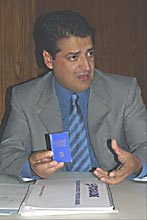 Here's one to turn your stomach: Jesús Caldera Infante, the former head of Fogade who was so corrupt his own staff rebelled rather than continue covering up for him, now says he's a victim of "political persecution." Responding to Assemblymember Pedro Carreño's investigation into his misdeeds, the guy says Carreño is only out to get him to forestall his intended run for the Táchira State governorship.
Here's one to turn your stomach: Jesús Caldera Infante, the former head of Fogade who was so corrupt his own staff rebelled rather than continue covering up for him, now says he's a victim of "political persecution." Responding to Assemblymember Pedro Carreño's investigation into his misdeeds, the guy says Carreño is only out to get him to forestall his intended run for the Táchira State governorship.[Which, for all I know, could be true: a fight between Pedro Carreño and Caldera Infante is more or less a fight between Al Capone and Bugsy Siegel as far as I'm concerned.]
What's galls me is the way kleptochavistas who, exceptionally, get into trouble immediately turn around and cynically co-opt the language used by the scores of real victims of chavista political persecution. Nevermind that the guy is STILL the top bureaucrat in the Carabobo State Government - nevermind that he's never been tried, or even indicted, or even faced more than parliamentary censure. Nevermind that he's still living high on the hog off the money he embezzled. Barf.
What's serious, though, is that Caldera Infante's preposterous gripe muddies the semantic waters, tending to raise questions about ulterior motives when real persecuted dissidents cry foul. Which isn't just infuriating, it's dangerous.
May 17, 2006
Bolivarianism and the (Re-)Birth of Hemispheric Politics
Over the last year or so, something new has happened in Latin America. For the first time since the heyday of Fidelista aggitation in the 1960s and early 70s, politics is now occurring on a hemispheric basis. Decisions taken in one country have consequences throughout the region; leaders increasingly find themselves operating on a Latin America-wide context.
Needless to say, I'm not much given to acknowledging Chavez's 'achievements' - but on this one, well, there's no getting around it: the re-birth of politics on a Latin American basis is clearly down to the decisions he's taken.
Evo Morales, more than any leader in recent hemispheric memory, owes his election to decisions taken by foreigners: now Bolivia's energy policy is made in a pétit committé with Fidel and Chavez. Lula, more than any other Brazilian leader in recent memory, finds himself caught managing a hemispheric crisis: now his poll numbers hinge on Evo's decisions. Peruvians and Mexicans, more than at any time in the past, find themselves in an internationalized election campaign: these days, the attack ads they see on TV take aim at a foreign head of state.
Chavez is at the root of this regionalization of political life - which more and more configures a genuinely hemispheric political sphere.
Maybe those of you who are a bit older find all this a bit less strange. Me? I was born in 1975, so I've only read about the last period of real hemispheric politics from history books. It feels very new to me - this sense that the rules of the game in Latin American politics are changing before our eyes, that the politics of any one country are no longer understandable without reference to what is happening in the rest of the region, in a process that tends to reconfigure Latin American politics more and more into a transnational game.
And here, for the first time, I start to get a sense of what Chavez means by Bolivarianism.
In purely domestic terms, the tag makes very little sense: Bolivar, the classic 19th century liberal, had a political vision that shares almost nothing with Chavez's grab-bag statism. For a long time, my sense had been that Chavez had simply co-opted the Libertador's name to exploit Venezuelans' deep-seated emotional link with his figure. But as we see Chavez's vision of a hemisphere-wide politics increasingly turn into a reality, we get a sense of what he actually means by bolivarianism: a disruptive transnational politics.
It's easy to see that his is a kind of impoverished Bolivarianism - one stripped of Bolivar's obsessive concern with establishing a formal legal basis for authority in the nascent Latin American state, one that's actually opposed to the enlightenment tradition of reverence for republican virtue that permeates Bolivar's thought. From Daniel O'Leary and Antonio José de Sucre we've passed into the hands of José Vicente Rangel and Ramiro Helmeyer. In Chavez's hands, Bolivarianism keeps its hemispheric ambition and its disruptive radicalism, but loses the liberal-republican heart of Bolivar's vision. As an ideology, it's a bit of an arroz-con-pollo sin pollo.
But in terms of internationalizing the political life of the hemisphere, you gotta hand it to him.
Needless to say, I'm not much given to acknowledging Chavez's 'achievements' - but on this one, well, there's no getting around it: the re-birth of politics on a Latin American basis is clearly down to the decisions he's taken.
Evo Morales, more than any leader in recent hemispheric memory, owes his election to decisions taken by foreigners: now Bolivia's energy policy is made in a pétit committé with Fidel and Chavez. Lula, more than any other Brazilian leader in recent memory, finds himself caught managing a hemispheric crisis: now his poll numbers hinge on Evo's decisions. Peruvians and Mexicans, more than at any time in the past, find themselves in an internationalized election campaign: these days, the attack ads they see on TV take aim at a foreign head of state.
Chavez is at the root of this regionalization of political life - which more and more configures a genuinely hemispheric political sphere.
Maybe those of you who are a bit older find all this a bit less strange. Me? I was born in 1975, so I've only read about the last period of real hemispheric politics from history books. It feels very new to me - this sense that the rules of the game in Latin American politics are changing before our eyes, that the politics of any one country are no longer understandable without reference to what is happening in the rest of the region, in a process that tends to reconfigure Latin American politics more and more into a transnational game.
And here, for the first time, I start to get a sense of what Chavez means by Bolivarianism.
In purely domestic terms, the tag makes very little sense: Bolivar, the classic 19th century liberal, had a political vision that shares almost nothing with Chavez's grab-bag statism. For a long time, my sense had been that Chavez had simply co-opted the Libertador's name to exploit Venezuelans' deep-seated emotional link with his figure. But as we see Chavez's vision of a hemisphere-wide politics increasingly turn into a reality, we get a sense of what he actually means by bolivarianism: a disruptive transnational politics.
It's easy to see that his is a kind of impoverished Bolivarianism - one stripped of Bolivar's obsessive concern with establishing a formal legal basis for authority in the nascent Latin American state, one that's actually opposed to the enlightenment tradition of reverence for republican virtue that permeates Bolivar's thought. From Daniel O'Leary and Antonio José de Sucre we've passed into the hands of José Vicente Rangel and Ramiro Helmeyer. In Chavez's hands, Bolivarianism keeps its hemispheric ambition and its disruptive radicalism, but loses the liberal-republican heart of Bolivar's vision. As an ideology, it's a bit of an arroz-con-pollo sin pollo.
But in terms of internationalizing the political life of the hemisphere, you gotta hand it to him.
May 15, 2006
Rayma strikes the right note

Katy says: With all due respect to Weil, this cartoon by El Universal cartoonist Rayma Suprani is rather brilliant. How best to sum up the petro-dollar carnival that is Chávez's European trip?
(Note: The third sign clockwise reads "Pay up to the SENIAT", our local tax collection agency).
Perhaps next year Chávez will get lucky and be crowned Carnival Queen of Gualeguaychú.
"Thank you, my foolish friends in the West"
Ian Buruma, a prolific Anglo-Dutch intellectual, nails Chavez in yesterday's Sunday Times. His little screed must be one of the most clear-headed, digestable-to-foreigners anti-Chavez polemics I've seen in print. [Nod to Alek for the link.]
Google sez...
Behold Google Trends - the net toy that tells you how many people are searching Google for what.
Fun fact number one: more people are searching for "Castro" than for "Chavez" on any given day.
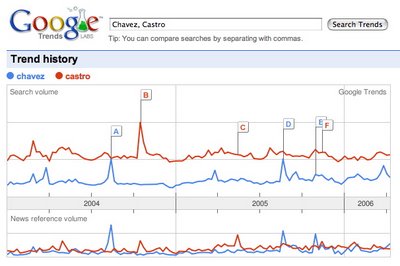
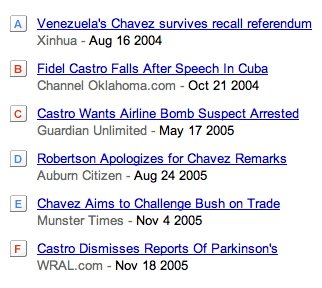
Fun fact number two: only in Venezuela do more people search for "Chavez."
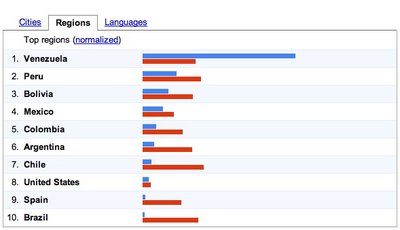
Fun fact number three: Castro isn't the only barbudo who gets more searches than Chavez.
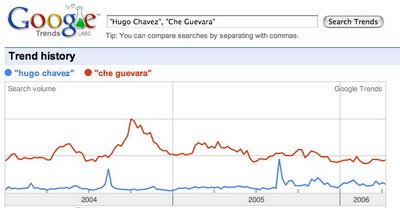
Make of it what you will...
Trust Harry Hutton to point me to cool new net gadgets in the silliest of possible contexts.
Fun fact number one: more people are searching for "Castro" than for "Chavez" on any given day.


Fun fact number two: only in Venezuela do more people search for "Chavez."

Fun fact number three: Castro isn't the only barbudo who gets more searches than Chavez.

Make of it what you will...
Trust Harry Hutton to point me to cool new net gadgets in the silliest of possible contexts.
May 14, 2006
Dissociated Opposition Chronicles
Nothing is quite so obnoxious as seeing the Opposition confirm, through its behavior, bits of overheated chavista rhetorical vilification. The classic one here is the charge of "dissociation" - of a deep disconnect with the new sociopolitical realities of the country. The charge has always been part truth, part overheated rhetoric. Now and then, though, an Opposition figure makes a move so aggressively ill-conceived, so psychotically detatched from political realities clearly visible even from an ocean away, that I can only shake my head in staggered disbelief.
 Yesterday, former Táchira governor Sergio Omar Calderón - perhaps best described as a second-tier provincial ancien regime dinosaur with a quadruple common-sense bypass and the electoral appeal of a neutered chihuahua - threw his hat into the presidential ring representing - wait for it - COPEI, a political party that Calderón - alarmingly - seems to believe still exists.
Yesterday, former Táchira governor Sergio Omar Calderón - perhaps best described as a second-tier provincial ancien regime dinosaur with a quadruple common-sense bypass and the electoral appeal of a neutered chihuahua - threw his hat into the presidential ring representing - wait for it - COPEI, a political party that Calderón - alarmingly - seems to believe still exists.
That Calderón - or, indeed, the skeletal remains of COPEI - could be so fantastically cut-off from political reality to think the guy could actually make a credible candidate (let alone have a chance of actually beating Chavez) demonstrates such awesome inanity, such an aggressively warped misunderstanding of contemporary Venezuelan politics you can only hang your head in despair.
And here we come back to a fundamental, festering, unaddressed problem with the entire Opposition political class - one I've mentioned before: there is no mechanism to induce a Venezuelan politician to retire, to change occupations, to just plain stop hanging around fouling up the public sphere once they're past their sell-by date.
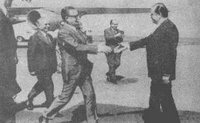 For the love of christ, RAFAEL CALDERA (who was already graying when he met Allende) is still writing newspaper columns - SEVENTY FOUR YEARS into his political career. (Watch for him to launch his campaign on the Convergencia ticket any time now - la propia generación de relevo.)
For the love of christ, RAFAEL CALDERA (who was already graying when he met Allende) is still writing newspaper columns - SEVENTY FOUR YEARS into his political career. (Watch for him to launch his campaign on the Convergencia ticket any time now - la propia generación de relevo.)
Pardon my exasperation, but it's maddening. They simply don't stop. They stay in the public sphere for years or decades after they've become a liability. There's no getting rid of them.
OK, just wanted to get that off my chest...
[/rant]
 Yesterday, former Táchira governor Sergio Omar Calderón - perhaps best described as a second-tier provincial ancien regime dinosaur with a quadruple common-sense bypass and the electoral appeal of a neutered chihuahua - threw his hat into the presidential ring representing - wait for it - COPEI, a political party that Calderón - alarmingly - seems to believe still exists.
Yesterday, former Táchira governor Sergio Omar Calderón - perhaps best described as a second-tier provincial ancien regime dinosaur with a quadruple common-sense bypass and the electoral appeal of a neutered chihuahua - threw his hat into the presidential ring representing - wait for it - COPEI, a political party that Calderón - alarmingly - seems to believe still exists.That Calderón - or, indeed, the skeletal remains of COPEI - could be so fantastically cut-off from political reality to think the guy could actually make a credible candidate (let alone have a chance of actually beating Chavez) demonstrates such awesome inanity, such an aggressively warped misunderstanding of contemporary Venezuelan politics you can only hang your head in despair.
And here we come back to a fundamental, festering, unaddressed problem with the entire Opposition political class - one I've mentioned before: there is no mechanism to induce a Venezuelan politician to retire, to change occupations, to just plain stop hanging around fouling up the public sphere once they're past their sell-by date.
 For the love of christ, RAFAEL CALDERA (who was already graying when he met Allende) is still writing newspaper columns - SEVENTY FOUR YEARS into his political career. (Watch for him to launch his campaign on the Convergencia ticket any time now - la propia generación de relevo.)
For the love of christ, RAFAEL CALDERA (who was already graying when he met Allende) is still writing newspaper columns - SEVENTY FOUR YEARS into his political career. (Watch for him to launch his campaign on the Convergencia ticket any time now - la propia generación de relevo.) Pardon my exasperation, but it's maddening. They simply don't stop. They stay in the public sphere for years or decades after they've become a liability. There's no getting rid of them.
OK, just wanted to get that off my chest...
[/rant]
Subscribe to:
Comments (Atom)
